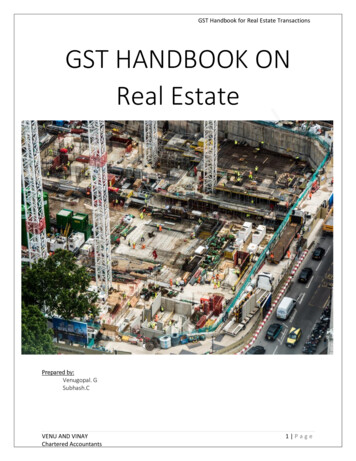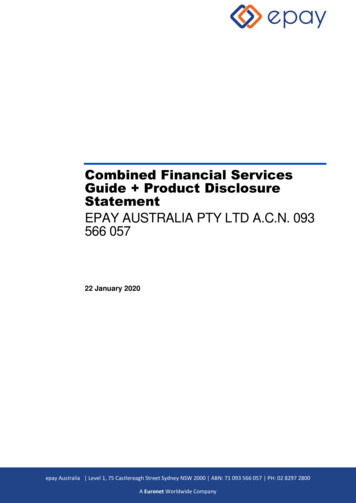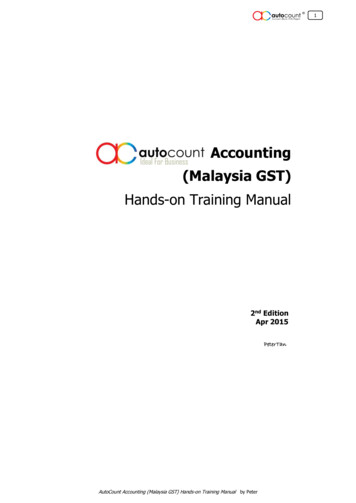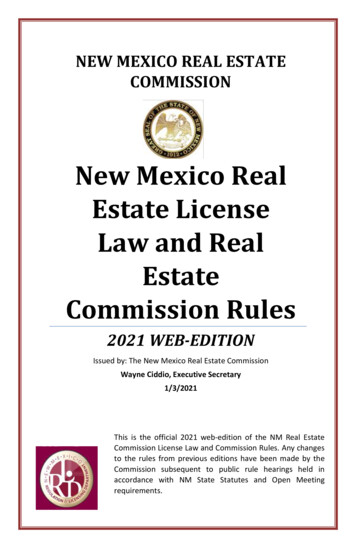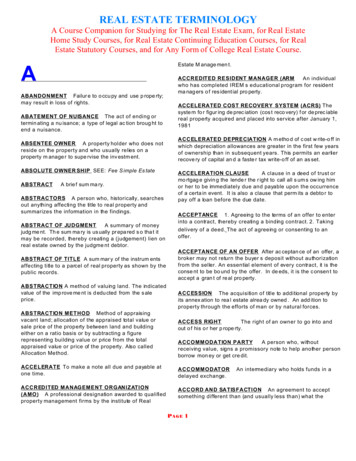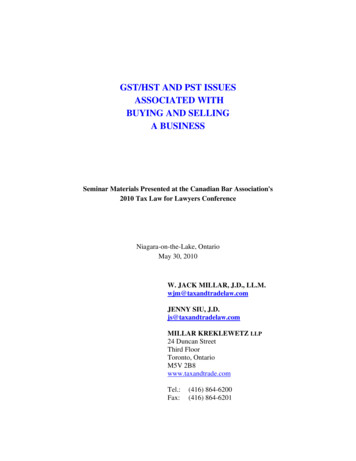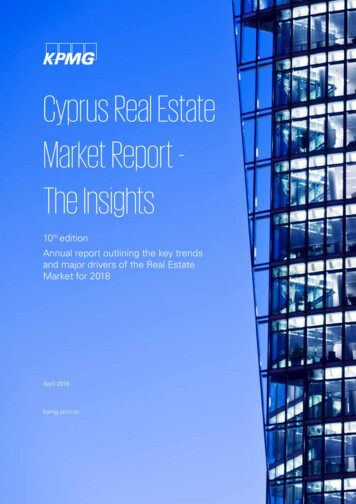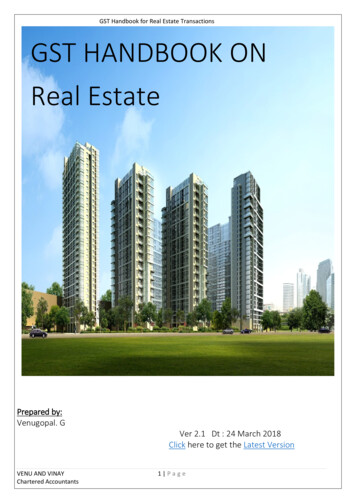
Transcription
GST Handbook for Real Estate TransactionsGST HANDBOOK ONReal EstatePrepared by:Venugopal. GVer 2.1 Dt : 24 March 2018Click here to get the Latest VersionVENU AND VINAYChartered Accountants1 Page
GST Handbook for Real Estate TransactionsAbout the AuthorCA Venugopal Gell is Partner in M/s. Venu & Vinay chartered Accountant, qualified inthe year 2002 by securing all India 45th Rank. He is also Certified Information SecurityAuditor. He has also completed Various Other Certificate courses from ICAI namelyDISA, Course on Business Valuation, Course on Internal Audit, Course on FraudDetection and Forensic Accounting. He has also completed a One Year Course from IIMon - Data Analysis and Business Intelligence.He is an active speaker at ICAI on GST esp on Technology and its implementationchallenges. He has authored various Industry Specific Handbooks on GST. ConductedWorkshops on filing returns with ease. He has developed lot of Excel based freeUtilities on GST like Json reader, creating Json files, GSTIN Validator, Composition vsRegular Benefit Analysis, GST Impact Reader etc. He is a GST faculty for ICAI andconducted various workshops and webinars. He is co-opted member of Indirect TaxesCommittee ICAI for the year 2018. He is Core-Committee member of FKCCI GST Wing.His major Areas of the practice are1.Design and Development of internal Controls and Process Documentation2.GST Implementation and Integration of Accounts & Return filing Utilities.3.Consulting in ERP Implementation / Migration.4.Management consultancy for Business Analysis and Growth and Design ofManagement Information Systems.Apart from Audits, he is a hands-on Coding in VB .Net, R, Python. He also reviewsDatabase Design.He conducted various workshops for corporates on1.Use of Technology2.Improve efficiency at work using Excel3.Building Automated Reports from Accounting & Financial ApplicationsHe was behind in the development & managing of cloud application like “Tax smile”,“InstaFinancials” and others.VENU AND VINAYChartered Accountants2 Page
GST Handbook for Real Estate TransactionsContentsRegistration .4General Provisions .4Taxes .5Rates of taxes applicable on different activities .5HSN Codes for various activities .6Time of raising Invoice / Discharge of Payment of Taxes .7Type of Tax to charge in Invoice .8Value of supply .8JDA – Joint Development Agreements .9Previous tax regime .9GST REGIME . 10Transactions in JDA & GST Treatment . 11Applicability of Tax . 11Time of Tax. 11Value of Supply . 12Input Tax Credit . 13General Provisions . 13Special Provisions to Real Estate Industry . 14Cross Utilization of Input Tax Credit between to Projects. 14Reversal of Input Tax Credit after completion of Project . 14Partial Reversal of Credits by applying Rule 42 / Rule 43 . 17Tax Planning Scope . 18GST Rates for various services . 19Accounts. 22Journal Entries in Books of accounts . 22Returns . 24Returns to be filed for a Month . 24Late Fees . 24Frequently asked Questions . 25VENU AND VINAYChartered Accountants3 Page
GST Handbook for Real Estate TransactionsRegistrationGeneral Provisions1. Liable to registera. Only if aggregate turnover* of a person is 20 Lakhs in a financial year ( 10 lakhs in Northeastern states, Uttarakhand, Sikkim)b. This threshold doesn’t apply to interstate supply of goods1 i.e. in case goods are supplied to differentstates compulsory registration has to be taken.c. Persons having VAT, service tax registration need to migrate to GST.* Aggregate turnover under real estate includes the receipts accepted by the company towards all theservices and sales excluding the taxes paid under CGST, SGST, IGST, UTGST Acts2. Not Liable to Register Person doing ONLY:a. Pure Labor Contracts for Construction of Single Residential unitsb. Enhancement under the Housing for All (Urban) Mission or Pradhan A builder Awas Yojana(PMAY)3. Other Points to Notea. Registration should be taken in every state of operation.b. Branches within the same state need not take separate registration. However, details of every branchlocated in the same state shall be shown as additional place of business for the purpose of availingthe Input Tax Credit.4. New registrations to be applied with GSTIN with valid e-Mail ID and phone numbera. The information entered and the documents uploaded are validated with PAN database, ARN(Application Reference Number - Acknowledgement) will be generated.b. Proper officer shall approve the same within 3 working days. If not the same gets autoapproved on 4th day from the date of application for registration.c. If the information provided and documents uploaded are not satisfactory to the properofficer, a show cause notice will be raised by the officer, and should be replied within 7working days.5. Input Service Distributor: If there are operations in multiple states, the person needs to take anAdditional registration for Head office to transfer the Common Input Service Credits received forbranches. Like the Marketing Spends, Audit services, where the service provider issue one invoice,and the services is applicable to all the branches of the company.1Notification 10/2017- Integrated Tax: Person making an Interstate supply of service needs to register only if the threshold limitis exceeded.VENU AND VINAYChartered Accountants4 Page
GST Handbook for Real Estate TransactionsTaxesRates of taxes applicable on different activitiesSl. No.12341ParticularsTAXABLEConstruction of a complex, building, civilstructureComposite supply of works contract as persec 2(119)Sale of construction services along with Land*Other construction servicesEXEMPTEDPure labour contracts of construction,pertaining to a single residential unitHSNGST Rate995418%995418%995412%995418%9954NIL* Building with Land / ApartmentsIn case of supply of service specified in column (3) of the Table above, involving transfer of property in landor undivided share of land, as the case may be, the value of supply of service and goods portion in suchsupply shall be equivalent to the total amount charged for such supply less the value of land or undivided share of land, as the case may be,The value of land or undivided share of land, as the case may be, in such supply shall be deemed to be onethird of the total amount charged for such supply.Explanation. – For the purposes of paragraph 2, “total amount” means the sum total of, - (a) considerationcharged for aforesaid service; and (b) amount charged for transfer of land or undivided share of land, as thecase may beVENU AND VINAYChartered Accountants5 Page
GST Handbook for Real Estate TransactionsHSN Codes for various activitiesHeading No.9954: Construction servicesHSNGroup 99541: Construction services of buildings995411Construction services of single dwelling or multi dwelling or multi-storied residentialbuildingsConstruction services of other residential buildings such as old age homes, homelessshelters, hostels etc.Construction services of industrial buildings such as buildings used for productionactivities (used for assembly line activities), workshops, storage buildings and othersimilar industrial buildingsConstruction services of commercial buildings such as office buildings, exhibition &marriage halls, malls, hotels, restaurants, airports, rail or road terminals, parkinggarages, petrol and service stations, theatres and other similar 299543995449954699547Construction services of other non-residential buildings such as educationalinstitutions, hospitals, clinics including vertinary clinics, religious establishments,courts, prisons, museums and other similar buildingsConstruction Services of other buildings n.e.cServices involving Repair, alterations, additions, replacements, renovation,maintenance or remodelling of the buildings covered above.Other Activities GroupGeneral construction services of civil engineering worksSite preparation servicesSpecial trade construction servicesInstallation servicesBuilding completion and finishing servicesVENU AND VINAYChartered Accountants6 Page
GST Handbook for Real Estate TransactionsTime of raising Invoice / Discharge of Payment of TaxesSection 13 of CGST Act, states that time of supply of services shall be the earliest of the following dates,namely: —a. the date of issue of invoice by the supplier, if the invoice is issued within the period prescribed undersub-section (2) of section 31 or the date of receipt of payment, whichever is earlier; orb. the date of provision of service, if the invoice is not issued within the period prescribed under subsection (2) of section 31* or the date of receipt of payment, whichever is earlier; orc. The date on which the recipient shows the receipt of services in his books of account, in a case wherethe provisions of clause (a) or clause (b) do not apply. Under sub-section (2) of section 31 the government notifies the period within which theinvoice to be raised If the raising of invoice is linked to milestones, the invoice to be raised once the milestone isreached*According to Rule 47. Time limit for issuing tax invoice is thirty (30) days from the date of the supply ofserviceProvided that where the supplier of taxable service receives an amount up to one thousand rupees in excessof the amount indicated in the tax invoice, the time of supply to the extent of such excess amount shall, atthe option of the said supplier, be the date of issue of invoice relating to such excess amount.VENU AND VINAYChartered Accountants7 Page
GST Handbook for Real Estate TransactionsType of Tax to charge in InvoiceServices directly in relation to an immovable property, including services provided by architects, interiordecorators, surveyors, engineers and other related experts or estate agents, any service provided by way ofgrant of rights to use immovable property or for carrying out or co-ordination of construction work or anyservices ancillary to the above services, is deemed to be provided at the location at which the immovableproperty is situated.Example:Seller placeRecipient placePlace ofsupplyTransactiontypeGST inInvoiceBangalore(KA)Chennai (TN)BangaloreIntra-stateCGST SGSTBangalore(KA)Udupi(KA)BangaloreIntra-stateCGST SGSTValue of supplyThe value of a supply of goods or services or both shall be the transaction value, which is the price paid orpayable for the said supply of goods or services or both where the supplier and the recipient of the supplyare not related and the price is the sole consideration for the supply.IncludeExcludes Other taxes, duties, cesses, fees, Discounts givenExcept: SGST, CGST, IGST before or at the time of Value of goods or services suppliedsupplyby the recipient after the supply has been Incidental expensesaffected "interest, late fee or penalty"a. if such discount is as per Subsidies (except central and stateagreementgovt. subsidies)b. input tax on suchdiscount is reversedValue at which tax to be memaintenanceSPA, Other amenities(-) Discount (any type)Total Value (A)VENU AND VINAYChartered AccountantsAmountXXXXXXXXXXXXXXX(XX)XXX8 Page
GST Handbook for Real Estate TransactionsCalculation of TAXGST Total value (A) *2/3*18%Note: 1/3 of the value is deemed to be the land value, so effectively 12% on the total value of apartment/Villawould be charged as GST.JDA – Joint Development AgreementsPrevious tax regimeSuppose the Land owner share is 40% and that of the developer is 60%. Total flats are 100, hence 40 belongsto land owner and 60 belongs to developer.VAT – can be under Composition orRegular1) Deduction for landService tax1) Deduction of landDeduction of land is available to the servicea) Option 1: Land deduction will not provider, provided that he will pay tax onbe available to the developer – the flats given to the land owner based onDeveloper Needs to pay on whole the valuation methods such as:amount received from sale of flatsa. Similar value of flatsfrom its customers.b) Option 2: Land deduction will be b. Cost markupavailable based on either market c. Value as on the date of entering JDAvalue of land or Guidance value ofland or agreed value of land to the Valuation will be either 30% based on26/2012 Notification or 40% based on thedeveloper.c) Valuation in case of Regular dealer valuation rule.will be 70% of the Constructionvalue.In case of Composition Scheme-nopartial rebate.Note: VAT Laws are state specific and each state has a method of computing VAT for Regular andComposition dealersUnder the previous regime there could have been either two or one agreement1) Two agreements – One for sale of land i.e. UDS and one for Construction agreement2) Single agreement – Both Sale of land and Construction are under the same agreementVENU AND VINAYChartered Accountants9 Page
GST Handbook for Real Estate TransactionsGST REGIMEBackdrop with a small exampleShare- Land owner 40% and Developer 60%; Land owner transfers full rights of 60% of the Land portion toDeveloper, in exchange of constructing 40% apartments.Relevant points of the acts to consider before understanding Taxation1. Supply includes Exchange – Section 7 of CGST act2. Schedule III, clause 5: Exclusion from Supplya. Sale of landb. Sale of Building; after completion3. Schedule II, 5(b): Works contracta. If first Consideration has been received after receivingi. the completion certificate from the competent authority orii. 1st occupancy occurred in any of the buildingThen No GST is applicable.b. Other way round: If property is sold before getting completion certificate from thecompetent authority or the 1st occupancy then GST will be applicable.c. If the flats are recognized at the time of entering the JD agreement even if the facing of theapartment, then it is the consideration for the development rights and this attracts GSTVENU AND VINAYChartered Accountants10 P a g e
GST Handbook for Real Estate TransactionsTransactions in JDA & GST TreatmentApplicability of Tax1. Land owner: Transfer of Land/Right by owner to developer for construction: Land is not a Good anda specific entry in Schedule III and hence no GST is leviable on sale of immovable property.2. Developer to Land Owner: Developer constructs & sells the 40% share of flats to Land owner over aperiod. GST is applicable.a. Time of supply: Continuous supply: Stage of completion of supply Advances if anyi.Receiving of land is in the form of advance received and hence GST needs to be paid as onthe date of entering JDAb. Value of supply: 1) Open market value of 60% of UDS (Undivided share of land) Non-refundabledeposit2) Like value of similar goods i.e. 40% Apartments or 60% UDS;3) Cost of constructing 40% Apartments 10% Markup.c. Rate of Tax: There is no Sale of Land, hence deduction of 1/3rd towards Land doesn’t arise. HenceTax Value of Supply * 18% is the tax rate.3. Developer– End Customer: As there is a sale of land, deduction of 1/3rd of Total Value arises and asdiscussed above GST is applicable on total collection @ 12%.4. Land owner to customer: Sale of Flats during construction will be liable to GST and the Land ownerwill have to pay GST. Same concept of 12%.5. Developer retained units: If after issuance of Certificate of Completion or 1st occupancy then notliable to GST. But input tax credit proportionately needs to be reversed.6. Land owner retained units: Similar as above point 5.Time of TaxSl No1.2.3.3.TransactionPoint of TaxationTransfer of Land by Land NO GST to LAND OwnerOwnerTransfer of Apartment by At the time of conveyance deed / allotment letter.developer to Land OwnerDeveloper– End Customer1. Completion of Mile Stone (or)Earliest of2. Receipt of Money from CustomerLand Owner– End Customer1. Completion of Mile Stone (or)Earliest of2. Receipt of Money from CustomerVENU AND VINAYChartered Accountants11 P a g e
GST Handbook for Real Estate TransactionsAgreement for sale of undivided share in land to PurchasersTransactionImpact of GSTThe Agreement for Sale entered between the Land Owners, theDeveloper and the Purchaser is for sale of undivided share in the land.Taxability – Sale of LandIn this regard, it may be noted that ‘Immovable Property’ is outside thescope and ambit of GST as per Schedule III of the CGST Act andaccordingly, the said transaction will not be considered as a ‘Supply’ underthe GST Laws and hence, no GST is payable on the same.Construction Agreement between the Developer and the PurchaserTransactionImpact of GSTAs discussed above, any construction of a property by a developer for a purchaseramounts to ‘Works Contract’ and accordingly, the subject transaction will be taxableunder the GST laws @18%.Taxability For the discussions on ‘Taxability’, ‘Place of Supply’, ‘Time of Supply’, ‘Input TaxCredit’, ‘Valuation’ etc., the portion dealing with ‘Outward Supply’ may be referredto.Value of SupplySl No1.2.TransactionTransfer of Land by LandOwnerTransfer of Apartment bydeveloper to Land OwnerPoint of TaxationNO GST to LAND OwnerTo be determined as CHAPTER IV: DETERMINATION OF VALUEOF SUPPLY of CGST Rules. Ref Rule 27Open Market Value of1) Undivided Share of Land received by builder2) Market Value of Apartments transferred to Landowner3.4.Developer– End CustomerActual Money received / Receivable.Earliest ofLand Owner– End CustomerActual Money received / Receivable.Earliest ofVENU AND VINAYChartered Accountants12 P a g e
GST Handbook for Real Estate TransactionsInput Tax CreditGeneral Provisions1. Every registered person shall be entitled to take credit of input tax (ITC) charged on any supply of goods orservices or both2. ITC available on any inward supply of goods or services or both only if used or intended to be used in the courseor furtherance of his business3. Conditions for availing eligible ITC by a registered person:Possession oftax invoicePayment made tovendor within 180days of InvoicedateMonthly Returnfurnished withindue dateReceipt ofGoods orServicesTax on supplyactually paid toGovt. by vendor4. ISD Credit Transfer:1. This would also include common services like Audit, Software services commonly procured at HO butportion of which is attributable to branches. To deal with this, HO has two options,2. opt as Input service distributor and distribute proportionate credits to respective branches, OR3. Invoice from HO to its branches for said common services. Rate of GST for such cross charge is the same rateas applicable to such Input Services.5. ITC not available on the following (Sec. 17(5) of CGST Act):a. motor vehicles except when they are used:i. for further supply of such vehicles, transportation of passengersii. for transportation of goodsb. following supplies:i. Food & Beverages, Outdoor catering etc. except where they are used for making an outward taxablesupply of same category of goods or servicesii. membership of a club, health and fitness centeriii. rent-a-cab, life insurance and health insurance except where Government notifies it as obligatory or areused for making an outward taxable supply of same category of goods or servicesVENU AND VINAYChartered Accountants13 P a g e
GST Handbook for Real Estate Transactionsiv. travel benefits extended to employees on vacation such as leave or home travel concessionc. works contract services for construction of Immovable propertyd. goods or services or both used for personal consumption6. Persons registered under Composition scheme not eligible for any Input Tax Credit7. The registered person making purchases from a taxable person who is under composition scheme is not eligiblefor Composition input tax credit.8. ITC set off and the preference in which it is set off:TaxesCGSTSGSTIGSTCGST 1st NA 2ndSGST NA 1st 2ndIGST 2nd 2nd 1stSpecial Provisions to Real Estate Industry1. General Rules of availing credit to be complied as per sec 16(2)2. Blocked credit of Works contract under Sec 17(5) (c) and (d) is NOT applicable since the same is used in furthersupply of such Works Contract.3. Refund of ITC i.e. excess utilized credit cannot be claimed as a refund.4. Input tax credit cannot be availed on the materials purchased and expenses incurred after obtaining theCompletion certificate.Cross Utilization of Input Tax Credit between to Projects1. In this Industry there is a possibility that one person is simultaneously carrying multiple projects under singleGSTIN.2. Purchase of Materials will be project specific or cross utilized3. Since the materials get utilized across the project, there is NO restriction under the Act to Utilize ITC projectspecific.4. Hence Input tax credit of One Project can be utilized for another.Reversal of Input Tax Credit after completion of ProjectThis is most debated topic in this Industry on the treatment of Input Tax Credit availed and utilized along withbalance un utilized after the completion of the ProjectVENU AND VINAYChartered Accountants14 P a g e
GST Handbook for Real Estate TransactionsITC after OCOption 1Option 2Reverse to extend of unsoldProjects, apply 17(2)No Full ReversalReverse balance in ElectronicCredit LedgerBalance Pay in CashReverse by Applying Rule 42Option 1As per the Option 1, after the completion of the project the dealer should follow the reversal as below1. Since the project is completed, it shall be treated as Exempt supply as per 17(3)2. No further credits to be accrued on the subsequent purchases as per 17(2)3. Credits availed in the past to be reversed as per 18(4),a. By Reversing the balance available in In Electronic Credit ledger.b. In case the balance is not sufficient then differential amount to be paid by way cash.The above method is very logical conclusion thought not specified in the Act specifically for Real estate Industry.Option 2A Detailed analysis is made for this option, since this will save huge cashflows to the Industry.- Sec 16 of the CGST law provides that a registered taxable person is entitled to avail the benefit of ‘Input Tax’charged on any supply of goods or services. The benefit of credit is available, when the goods / services are ‘usedor intended to be used in the course or furtherance of business’.- The term ‘Input Tax’ is defined vide Sec 2(62) of CGST law, to mean the CGST, SGST, IGST, UTGST charged onany supply of goods or services or both including IGST paid on import of goods and tax paid under the reversecharge mechanism. Thus, the taxes in the form of CGST, SGST, UTGST and IGST charged on the procurement ofgoods and / or services are available as Input Tax credit in terms of Sec 16.- The words “used or intended to be used” and “in the course or furtherance of business” are not being definedunder GST Acts. Though not defined, the words are of wide import. The words “In the course or furtherance ofbusiness” could include all such activities, which are being carried out during the course of running of the businessand also activities, which are in the interest of business.- Whenever a builder starts building a complex, their prima facie motive is to sell all the flats to buyers. Thus, Abuilder assumes that all the flats will be sold before completion thereby making them taxable supplies.- Given the above, the tax paid on supplies, which are used or intended to be used in the course or furtheranceof business and which falls within the definition of “Input Tax” would be available as Input Tax Credit on the basisof satisfaction of other conditions as prescribed under Sec 16 of the CGST Act.Further, Sec 17 of the CGST Law provides for restriction of GST paid on certain specified supplies of Goods orServices.VENU AND VINAYChartered Accountants15 P a g e
GST Handbook for Real Estate Transactions- In the present context, it is important to note Sl no 5 of Schedule III, which provides that “sale of land and,subject to clause (b) of paragraph 5 of Schedule II, sale of building”, shall be treated as activities or transactionswhich shall be treated neither as supply of goods nor supply of services. The reference of clause (b) of paragraph5 refers to supply, where either completion certificate is received or there has been first occupation.-In this regard, it is important to note Sec 17(2) of the CGST law, which provides for the following:Here the goods or services or both are used by the registered person partly for effecting taxable supplies includingzero rated supplies under this act or under the Integrated Goods and Services Tax Act and partly for effectingexempt supplies under the said act, the amount of credit shall be restricted to so much of the input tax as isattributable to the said taxable supplies including zero rated supplies”.- Sec 17 provides for apportionment of credit and blocked credits and Sec 17(2) in specific provides forrestriction in Input Tax Credit, when used in making ‘Exempt Supply’. It is now important to understand ‘ExemptSupply’ and the same is defined vide Sec 2(47) of the CGST law.“exempt supply” means supply of any goods or services or both which attracts nil rate of tax or which may bewholly exempt from tax under section 11 or under section 6 of the integrated Goods and Services Tax Act, andincludes non - taxable supply.- On perusal of the above, it is clear that, for the supply to be considered as ‘Exempt’, there has to be a ‘Supply’in the first instance and then should be exempted. In the instant scenario, the transactions listed in schedule IIIare those activities or transactions, which are considered neither as supply of goods or services and accordingly,Sec 17(2) would have no applicability. We now proceed further to examine, whether the transactions coveredunder Schedule III can be construed as ‘Non – Taxable Supply’.- The term ‘Non- Taxable Supply’ is being defined vide Sec 2(78) of the CGST law to mean “a supply of goods orservices or both which is not leviable to tax under this act or under the Integrated Goods and Services Tax Act”.- On perusal of the above, the definition also starts with ‘supply of goods or services’ and as the transactionslisted in Schedule III are neither goods nor services and therefore, cannot be considered as
decorators, surveyors, engineers and other related experts or estate agents, any service provided by way of grant of rights to use immovable property or for carrying out or co-ordination of construction work or any services ancillary to the above services, is deemed to be provided at the location at which the immovable property is situated.
